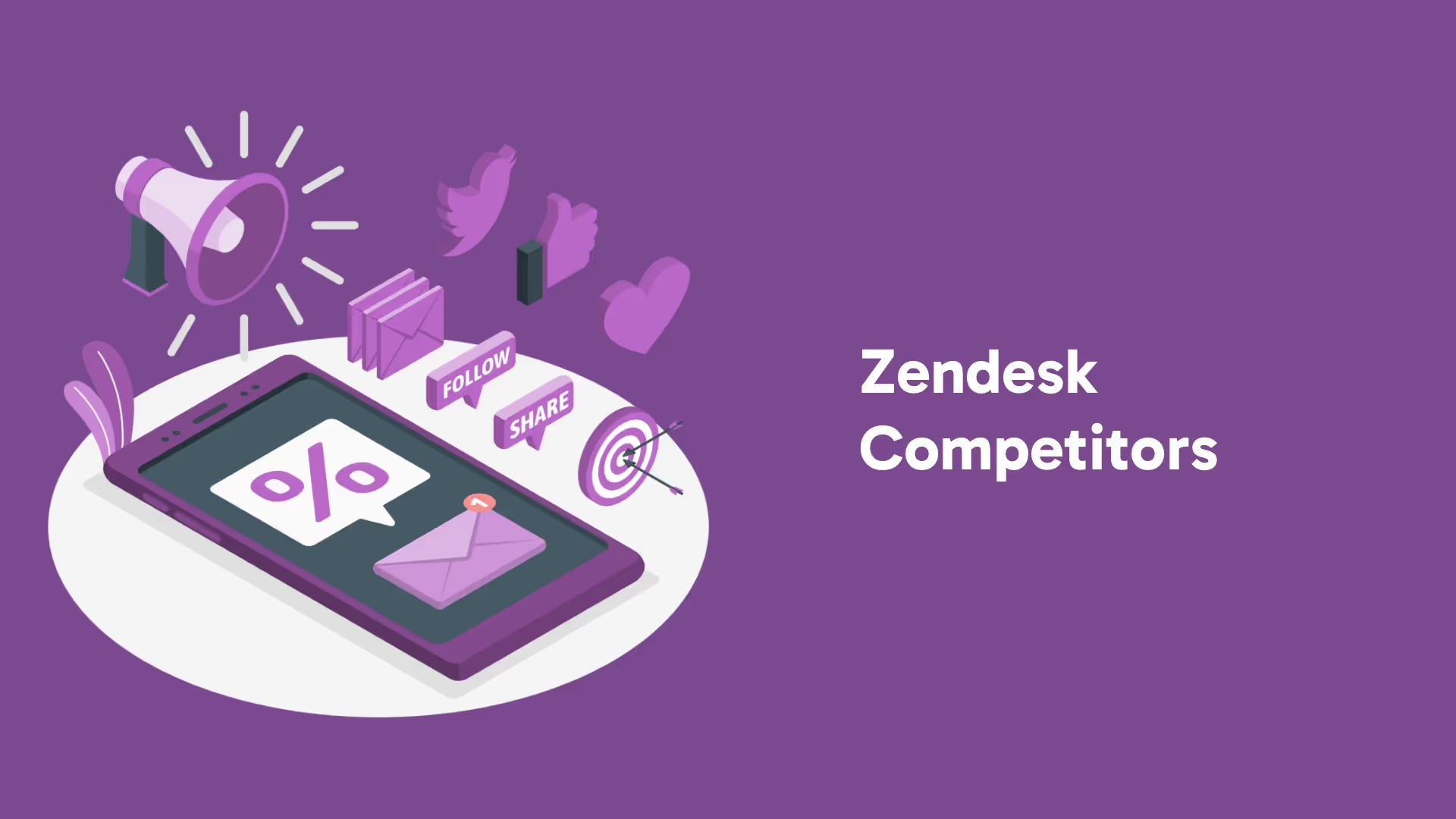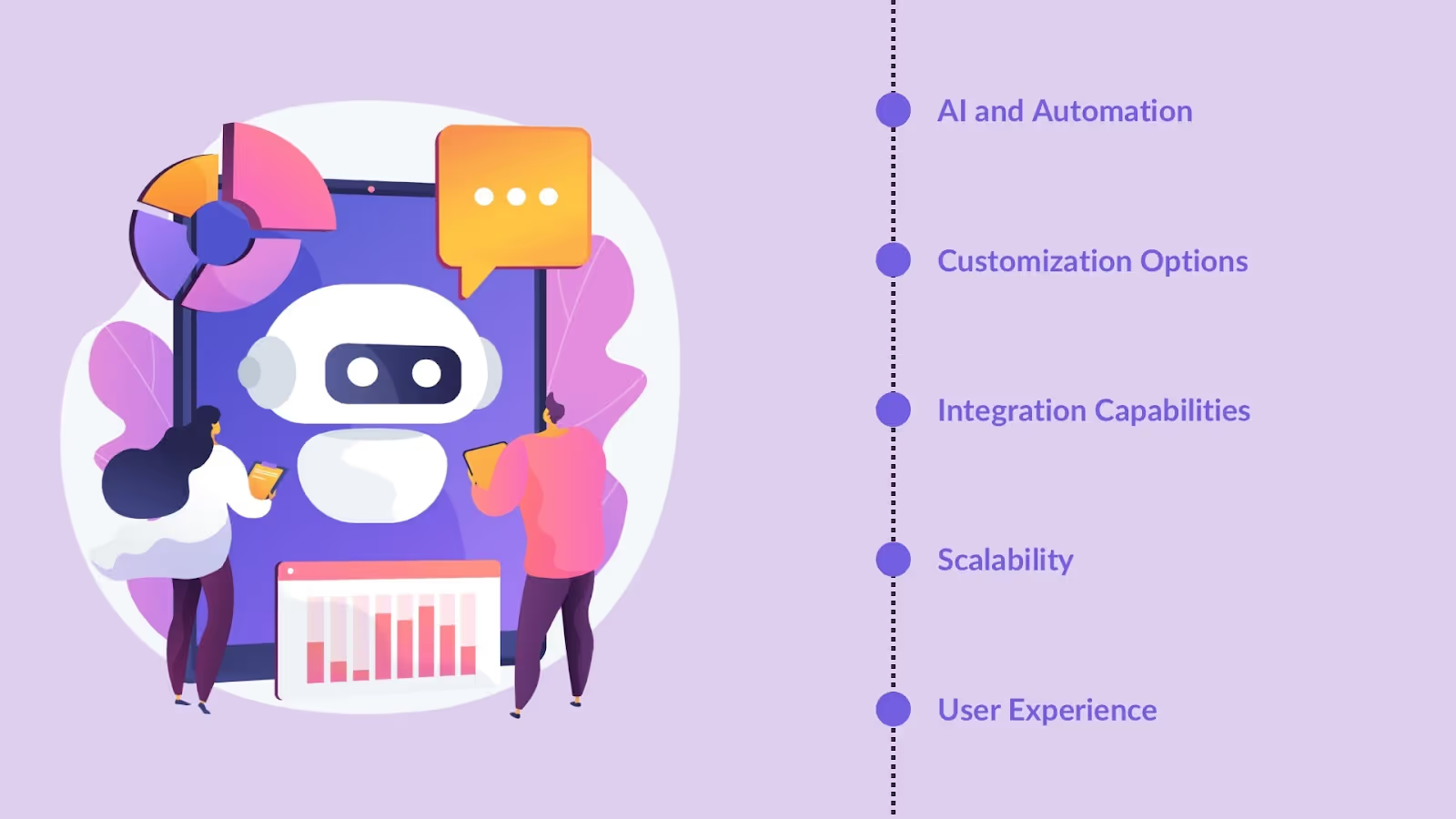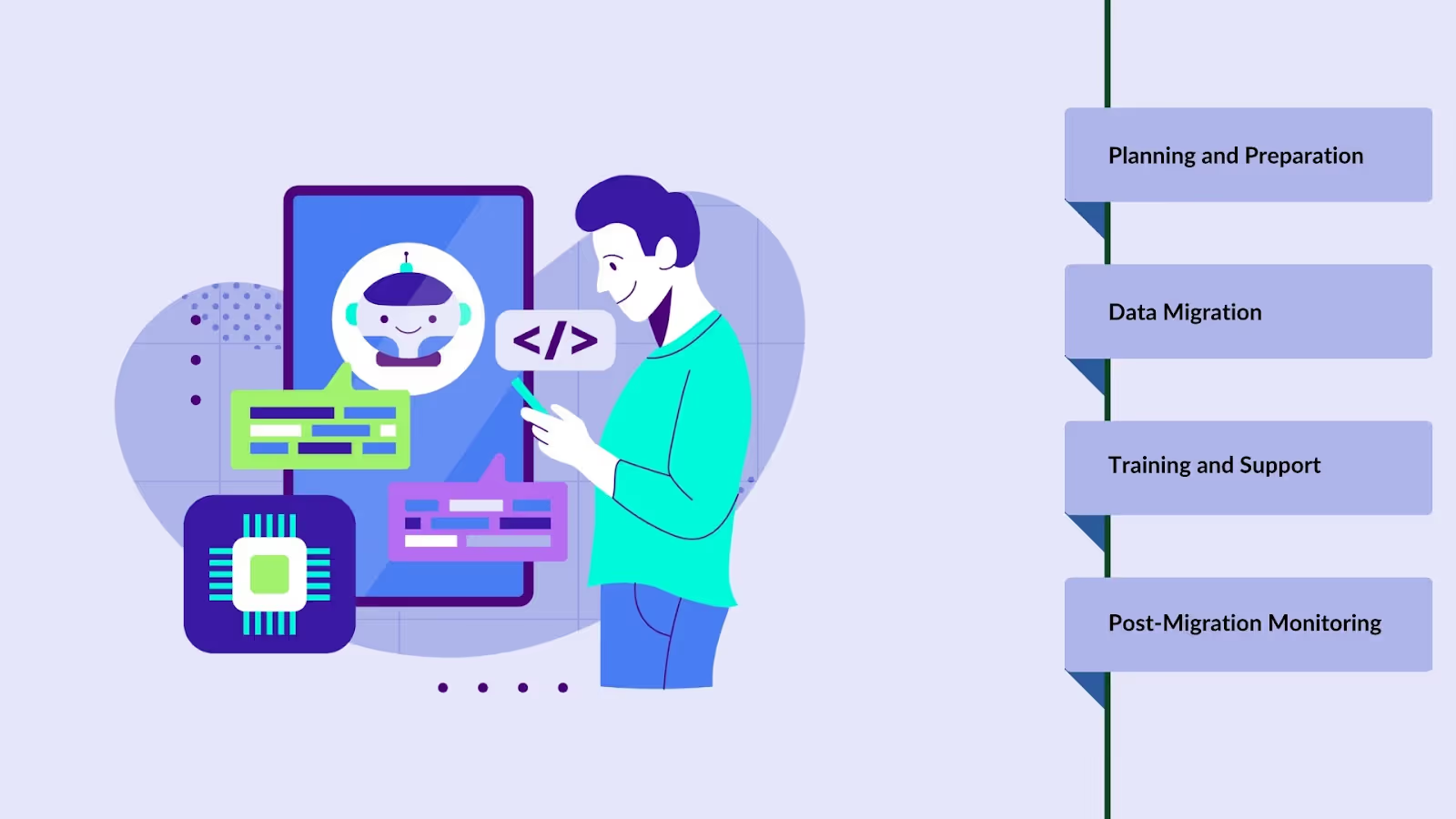Top Zendesk Competitors and Alternatives for 2024


Don’t miss what’s next in AI.
Subscribe for product updates, experiments, & success stories from the Nurix team.
In today's competitive business environment, delivering exceptional customer support isn't just an option, it's a necessity. Zendesk has been one of the leading solutions for managing customer service operations, but many businesses are now on the lookout for alternatives to Zendesk that offer more tailored features, better pricing, or enhanced scalability.
In this blog, we'll explore the top 10 Zendesk alternatives for 2024, each offering unique advantages to help you elevate your customer support strategy.
Understanding the Importance of Customer Support Software
Customer support software is critical to managing customer interactions, solving problems, and maintaining a good brand image. The right software can help you automate repetitive tasks, respond faster, and give your agents the tools to provide personalized customer support.
Why Businesses Are Seeking Zendesk Alternatives
As businesses grow and customer expectations change, many find their current tools no longer meet their needs. Zendesk is powerful but is often seen as a premium option that's only right for some businesses, especially considering the cost.
- Cost Concerns: Zendesk's feature-rich platform comes with a hefty price tag, making it less attractive for smaller businesses or startups with limited budgets. As businesses grow, the costs can add up, and companies look for more cost-effective Zendesk alternatives that offer full support capabilities.
- Customization Limits: While Zendesk has customization options, some businesses find them limited, especially when integrating with niche tools or tailoring workflows to particular needs. Companies need more flexibility in setting up and managing their support systems and looking for platforms that offer more customization in a Zendesk alternative.
- Scalability Issues: Zendesk is scalable, but businesses often run into issues as they grow, especially regarding costs. Companies that experience rapid growth look for Zendesk alternatives that offer more flexible and affordable scaling options to meet customer demands without breaking the bank.
- User Experience: Zendesk's interface is complex and overwhelming for some users, especially for support teams that need to be tech-savvy. This can lead to a steep learning curve, reduced productivity, and more time spent onboarding new agents. Zendesk alternatives with more intuitive and user-friendly interfaces are preferred by companies looking to simplify their operations.
But what sets these tools apart, and why should you consider them?
Key Features to Look for in Customer Support Software

When selecting a Zendesk alternative, it's essential to consider several key features to ensure the platform aligns with your business needs:
- AI and Automation: Automation can handle the easy stuff, so your agents can focus on the hard stuff. AI-powered features like sentiment analysis and intelligent ticket routing can supercharge your support team in a Zendesk alternative.
- Customization Options: Every business is unique, and so are its customer service needs. Look for a Zendesk alternative that offers customizable workflows, dashboards, and reporting to fit your business needs.
- Integration Capabilities: Seamless integration with your existing tools like CRM systems is critical to keeping things running smoothly and having all customer data in one place in a Zendesk alternative.
- Scalability: As your business grows, your customer support should grow. Flexible pricing and scalable features are a must for growth without the hassle.
- User Experience: The Zendesk alternative should be easy to use for both your support team and your customers. A simple interface can reduce agent training time and improve the overall customer experience.
Let’s dive into which solutions made the cut and why they could be game-changers for you.
Top 10 Zendesk Alternatives for 2024
As businesses look for more specialized and flexible customer support solutions, looking into Zendesk alternatives will reveal options with better AI, more customization, and cheaper pricing.
Here are the top 10 Zendesk alternatives for 2024, each with its own unique features to suit different business needs.
- Nurix AI:
Nurix AI offers advanced AI-powered customer support tools with seamless multi-channel integration at an affordable price. Its focus is on automation and personalization, making it perfect for businesses looking to supercharge their customer service.
- AI-Powered Customer Support: Nurix AI has advanced AI-driven customer support tools that auto-respond to common customer questions. These tools help businesses reduce response times and manage a high volume of interactions.
- Chatbots and Virtual Assistants: Nurix AI has intelligent chatbots and virtual assistants that can handle various customer service tasks, from answering FAQs to complex processes. These bots understand natural language and engage in conversations that often resolve issues without human intervention.
- Customer Experience Analytics: With Nurix AI, businesses get powerful analytics to understand customer behavior, preferences, and pain points. These insights refine customer service strategies, personalize interactions, and boost CSAT scores.
- Automated Ticketing Systems: Nurix AI's automated ticketing system prioritizes and routes tickets based on urgency and agent availability to resolve issues quickly.
- Personalization Engines: Nurix AI's personalization engines tailor interactions based on individual customer preferences, purchase history, and relevant data to deliver highly relevant recommendations and support.
- Voice and Speech Recognition: Nurix AI has advanced voice and speech recognition to enable voice-based customer interactions, perfect for voice assistants and automating phone-based customer service.
- Zoho Desk
Zoho Desk is a budget-friendly option with multi-channel support and basic AI. It's good for smaller businesses but needs more customization depth of more advanced options.
- Multi-Channel Support: Zoho Desk has a platform to manage customer interactions across channels like email, social media, and chat. It has basic AI for handling routine queries but limited customization and AI capabilities.
- Basic Automation: Zoho Desk's automation helps streamline workflows but focuses on routine tasks rather than personalization and AI-driven engagement.
- Integrated Analytics: Zoho Desk has analytics to track support team performance and basic insights, but it does not have advanced customer behavior analytics like those found in a better Zendesk alternative.
- Salesforce Service Cloud
Salesforce Service Cloud is a CRM-connected platform for businesses in the Salesforce universe. While it has AI, it requires extensive customization to match the flexibility of top Zendesk alternatives.
- CRM Integration: Salesforce Service Cloud is known for its deep CRM integration, using customer data for more personalized support. It has AI features that enhance customer interactions but less personalized automation and adaptability than a more advanced Zendesk alternative.
- Virtual Assistants: Salesforce has AI-powered virtual assistants. They are functional but more general-purpose than the specialized AI tools in top Zendesk alternatives.
- Freshdesk
Freshdesk offers user-friendly omnichannel communication tools with basic AI automation. While it handles routine tasks well, it lacks the deeper natural language processing of top-tier alternatives.
- Omni-Channel Communication: Like many other support tools, Freshdesk manages customer interactions across multiple channels, focusing on ease of use and integration. Its AI-powered automation handles routine tasks but lacks the deeper natural language processing of a more advanced Zendesk alternative.
- Collaborative Tools: Freshdesk has team collaboration features that are good for basic needs but don't need advanced analytics or AI customization of more specialized Zendesk alternatives.
- Intercom
Intercom is known for its proactive customer engagement and real-time chat features. Although it excels at onboarding, its chatbot capabilities are less advanced in handling complex queries than those of leading alternatives.
- Proactive Engagement: Intercom is known for proactive customer engagement, using in-app messaging and real-time chat to preempt customer issues. The chatbot is good for basic tasks but not as advanced in natural language understanding or complex problem-solving as the top Zendesk alternative.
- Customer Onboarding: Onboarding tools are suitable for new customers but have limited personalization based on AI-driven insights, as with the top Zendesk competitors.
- Gorgias
Gorgias is built for e-commerce businesses and integrates with online platforms. Its automation for order-related inquiries is strong, but it lacks broader AI-driven customization as in more general-purpose alternatives.
- E-Commerce Integration: Gorgias integrates with e-commerce platforms a streamlined solution for order-related inquiries. Automation handles common customer questions well. It is e-commerce-focused, with less emphasis on broader AI-driven customization than top Zendesk alternatives.
- Unified Inbox: Gorgias has a unified inbox for managing interactions across channels. It prioritizes simplicity and ease of use over AI integration, as in top Zendesk alternatives.
- ServiceNow
ServiceNow is a full-featured IT service management platform with many automation and self-service options. However, its focus on IT services limits its ability to compete with more customer-centric alternatives.
- IT Service Management: ServiceNow is great for IT service management. It automates ticket assignments and workflows. It has AI tools for efficiency but is more focused on IT services than customer support customization found in better Zendesk alternatives.
- Self-Service Options: ServiceNow's self-service portals are comprehensive, allowing customers to resolve issues on their own. However, they are less focused on advanced AI-driven personalization found in top Zendesk alternatives.
- HubSpot Service Hub
HubSpot Service Hub has integrated CRM and customer feedback tools, perfect for businesses that want simplicity and integration. However, its features are more general and may not have the advanced AI-driven capabilities for more specialized support needs.
- Integrated CRM: HubSpot Service Hub integrates deeply with HubSpot's CRM, creating a single platform for customer support. Automation and feedback tools are good but more general, focused on simplicity and integration rather than advanced AI-driven capabilities found in top Zendesk alternatives.
- Customer Feedback Tools: This tool provides tools for gathering customer feedback and insights, but it is not as deep as real-time AI analytics found in leading Zendesk alternatives.
- LiveAgent
LiveAgent is an all-in-one support suite with a help desk, live chat, and call center features. While it covers the basics, it offers minimal AI compared to the top alternatives.
- All-in-One Support Suite: LiveAgent combines help desk, live chat, and call center features into one platform, focusing on support. Its AI is basic for general support tasks, lacking deep customization or analytics found in top Zendesk alternatives.
- Call Queue Management: LiveAgent's call queue management handles inquiries efficiently, prioritizing the essentials without the advanced AI found in more specialized Zendesk alternatives.
- Help Scout
Help Scout is for simplicity and scalability and is suitable for small businesses and startups. However, its simplicity must include the more advanced alternatives' advanced AI-driven customization and personalization tools.
- Simple and Scalable: Help Scout is a straightforward solution for small businesses and startups, focusing on ease of use and quick deployment. Its features are robust for general needs but lack advanced AI-driven customization and personalization tools.
- Integrated Knowledge Base: Help Scout's knowledge base is integrated so customers can easily find common answers with simplicity over advanced AI-driven personalization.
Now, let’s break down what to look for when making this important switch.
How to Choose the Right Customer Support Software for Your Business
Choosing the right customer support software depends on many factors, including business size, industry, budget, and existing technology stack. Here are some tips to help you make the right choice:
- Assess Your Business Needs: What does your business need from a customer support platform? Do you need robust automation, deep customization, or seamless CRM integration? Knowing what you need will help you narrow down your options.
- Evaluate Integration Capabilities: Ensure your chosen platform integrates with your existing tools and systems. This is critical for smooth operation and for centralizing and easily accessible customer data.
- Consider Scalability: As your business grows, your customer support software should grow with it. Look for platforms with flexible features to support your growth.
- Test User Experience: The platform should be easy to use for both your support team and your customers. A user-friendly interface will reduce agent training time and improve overall customer experience.
Let's go over some common hurdles you might face during this transition.
Potential Challenges When Switching from Zendesk
While exploring Zendesk alternatives can lead to significant improvements, it's essential to be aware of potential challenges:
- Data Migration: Migrating from Zendesk to a new platform can be complex. Make sure the one you choose has good support for migrating your customer data without loss.
- Learning Curve: Your support team will need time to get up to speed on a new platform. Choose a platform with an intuitive interface and good training resources to minimize disruption.
- Integration Challenges: If you use specific tools and systems, ensure the new platform integrates with them so there is no operational downtime.
Switching platforms can be seamless if you follow these steps.
How to Seamlessly Transition from Zendesk to a New Platform

Switching from a well-established platform like Zendesk to a new customer support software can be daunting, but with careful planning and execution, it can be a smooth process. Here's how to ensure a seamless transition:
- Planning and Preparation: Before you switch, you must have a plan. This includes setting timelines, identifying key people, and determining what features and capabilities you need in a new platform. Do a needs analysis to choose the right software for your business.
- Data Migration: One of the most essential parts of switching to a new platform is migrating your existing data. This includes customer records, past conversations, ticket history, and other relevant information. Ensure the new platform supports data migration from Zendesk and have a plan to back up all data before you start the migration. Test the migration process on a small scale before you fully commit to see if there are any issues.
- Training and Support: To minimize disruption, train your support team on the new platform. This includes comprehensive training sessions, user manuals, and ongoing support to help your team get used to the new system. Consider appointing a project manager to oversee the transition and address any concerns.
- Post-Migration Monitoring: After the migration, monitor the new platform to ensure everything works as expected. This includes tracking KPIs such as response times, ticket resolution rates, and customer satisfaction scores. Be prepared to adjust as needed to optimize the platform's performance and meet your business needs.
And when it comes to choosing the best, here’s why Nurix AI outshines Zendesk.
Why Nurix AI is a Better Zendesk Alternative
When choosing the right customer support software, businesses must consider various factors, such as the ability to scale, customize, and integrate with existing tools. Nurix AI emerges as a superior alternative to Zendesk for several compelling reasons:
Key Industry Trends in Customer Support Software
The customer support software industry is rapidly evolving, driven by technological advancements and changing customer expectations. Businesses must stay ahead of these trends to provide the best possible support.
- AI and Machine Learning: AI and machine learning are transforming customer support by automating tasks, predicting customer needs, and providing real-time insights. As AI improves, it will only become more important in customer support, so it's a must-have in modern support software.
- Omnichannel Support: Customers expect support across all channels – chat, email, social media, or phone. Omnichannel support solutions allow you to manage all interactions across multiple channels in one platform so customers get a seamless experience no matter how they contact you.
- Self-Service and Automation: There's a growing demand for self-service options like knowledge bases, FAQs, and automated chatbots so customers can find answers and resolve issues on their own. Automation takes it to the next level by handling routine tasks so support agents can focus on the complex stuff. This trend is all about more efficient customer-empowered support.
- Personalization: Personalizing customer interactions is becoming more critical as businesses want to build stronger customer relationships. This means software that can analyze customer data and give recommendations, support, and follow-ups. Personalization improves not only customer satisfaction but also loyalty and retention.
The Future of Customer Support Software
As technology continues to evolve, so will the tools businesses use to support their customers. The future of customer support software is likely to be shaped by several key developments:
- Increased AI Integration: AI will be more woven into customer support platforms, with more advanced tools to manage customer interactions. Future AI will include better natural language processing (NLP) so we can have more human-like conversations and understand complex customer questions.
- Greater Emphasis on Data Security: As more customer data is collected and analyzed, data security will be top of mind. Companies will need to make sure their customer support software is compliant with the latest security standards and regulations to protect customer data from breaches and unauthorized access.
- Cloud-Based Solutions: The shift to the cloud will continue, giving us more flexibility, scalability, and remote access. Cloud platforms allow us to scale our support operations quickly and give our support teams the tools they need from anywhere in the world.
- Customer Experience (CX) Focus: Customer support will focus on enhancing the overall customer experience rather than just resolving issues. This will require software that can track and improve CX metrics like customer satisfaction scores, first response times, and issue resolution rates. Companies that prioritize CX will see higher customer retention and loyalty.
Conclusion
The customer support landscape is changing fast, and while Zendesk has been a leader in this space, businesses now have many more options that offer more tailored, affordable, and scalable solutions. Nurix AI stands out as one of the best Zendesk alternatives because of its advanced AI capabilities, custom workflows, seamless CRM integration, and user-friendly interface. Choose the right customer support software and you'll increase efficiency, customer satisfaction, and growth.
Ready to revolutionize your customer support? Discover how Nurix AI can transform your customer service operations with its powerful features and affordable pricing. Try it out now!

Don’t miss what’s next in AI.
Subscribe for product updates, experiments, & success stories from the Nurix team.









